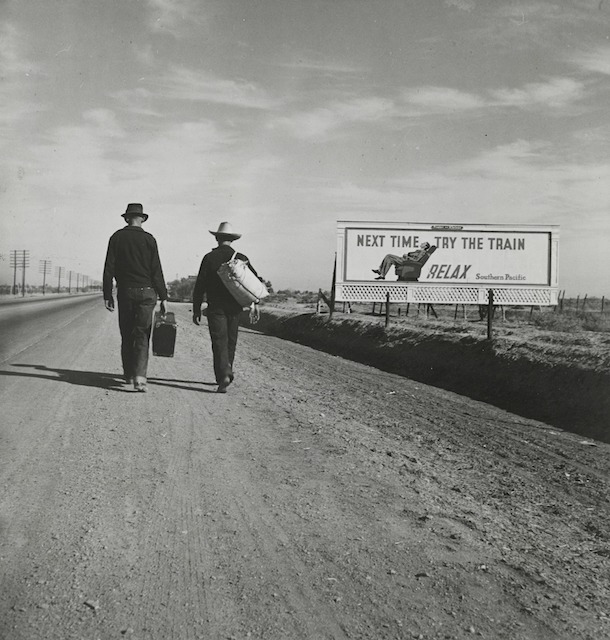
Dorothea Lange On the road to Los Angeles, California 1937

We passed 3 million global cases.
• US records 1,330 #coronavirus deaths in 24 hours: Johns Hopkins
• The US now has an overall death toll of 54,841, with 964,937 confirmed infections, according to a tally by the Johns Hopkins University at 8:30 pm (0030 GMT Monday)
• Sweden is the favorite of the anti-lockdown crowd, but contrary to what they claim, Sweden isn’t doing very well at all, so it’s a bit of a mystery why.
• Sweden is no. 8 (out of 200+) in the world in deaths per million people, in which it is 3 times worse than neighbors Denmark and 6 times worse than Norway and Finland. It’s even worse than the US.
• Deaths per million population (Worldometer):
Belgium 612
Spain 496
Italy 441
France 350
UK 305
Netherlands 261
Ireland 220
Sweden 217
Switzerland 186
US 167

NOTE: lowest number of global deaths for a long time.
• Cases 3,008,196 (+ 73,557 from yesterday’s 2,934,639)
• Deaths 207,361 (+ 3,678 from yesterday’s 203,683)

From Worldometer yesterday evening -before their day’s close-
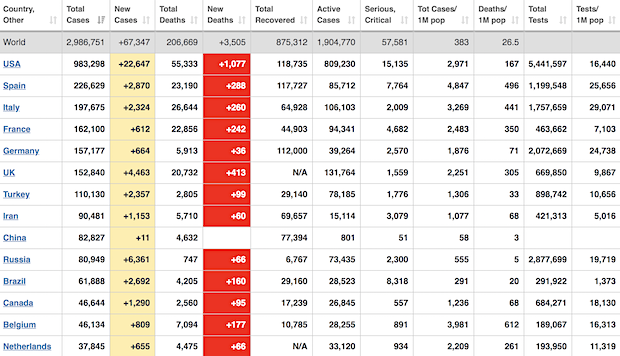
From Worldometer – Among Closed Cases, Deaths have fallen to 19%
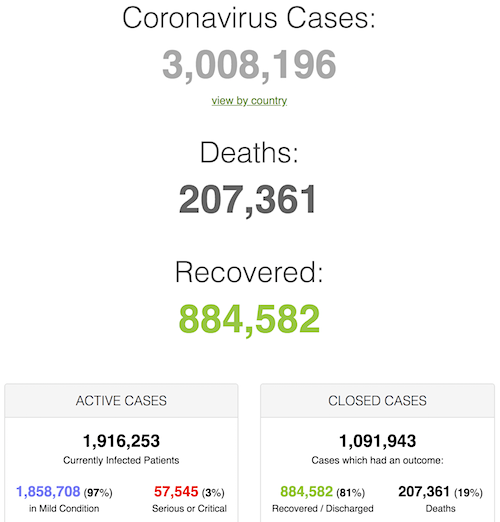
From SCMP:
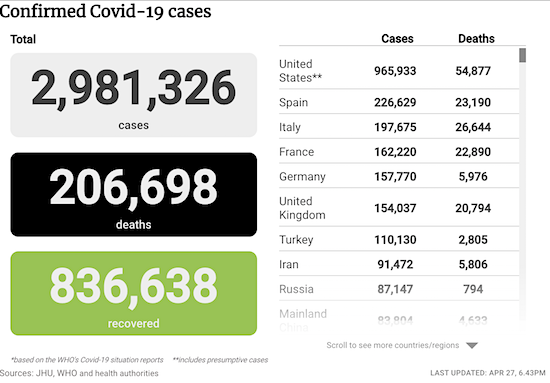
From COVID19Info.live:
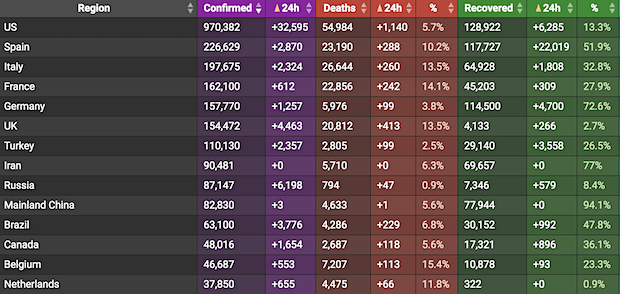

As an aside: the ambassador claims that “About 30% of people in Stockholm have reached a level of immunity..” The only numbers of any antibodies I’ve seen on this globally were in the region of 5% or less. How then do the Swedes measure it?
• Sweden’s Stay-Open Approach Is Creating Herd Immunity Quickly – Ambassador (JTN)
Sweden’s decision to keep schools, malls and restaurants open with limited restrictions during the pandemic is yielding success, with its capital city about to reach herd immunity in the next few weeks, according to the country’s ambassador to the United States. “About 30% of people in Stockholm have reached a level of immunity,” Ambassador Karin Ulrika Olofsdotter told NPR in an interview published Sunday. “We could reach herd immunity in the capital as early as next month.” Herd immunity means between 60% and 80% percent of a country’s population has become immune to a virus, either recovering from it or through immunization. Sweden banned gatherings of over 50 people but otherwise left schools, restaurants and malls open, provided citizens observe social distancing.
Facilities that don’t comply have been aggressively closed down. Sweden has reported more than 18,500 confirmed coronavirus cases and 2,194 deaths as of Sunday. The country’s approach to the pandemic has bucked much of the Western world, and generated controversy. “We share the same goal as all other countries, and that is of course to save as many lives as possible and protect public health,” Olofsdotter explained to NPR. “So we face the same reality as everyone else. But what’s different, and I think it’s important to underline that all countries are different, is that politicians take the measures that they think works best for their country and their general public.”


Airlines receive hand-outs, their shares surge. Why oh why should this proft go to shareholders, when it’s made possible only through taxpayer dollars?? The Airfrance/KLM CEO was set to get a huge bonus because he managed to get the state bailouts; only at the very last minute did a few parliamentarians prevent that from happening? Doesn’t anybody care anymore that we don’t have financial markets but pretend we do?
• European Shares Rise On Airline Surge, Upbeat Earnings (R.)
European shares rose on Monday, as airline stocks soared on hopes of state support, while a slew of upbeat earnings added to optimism over signs many countries would soon ease tough lockdown measures. Shares of Lufthansa jumped 7.2%, with Berlin expected to decide on state support, while Air France KLM rose 5.2% after the government said it would give a 7-billion-euros ($7.6 billion) aid package. Positive quarterly reports also helped. German drugs and pesticides company Bayer gained 2.8% and Deutsche Bank jumped 7.7% after their first-quarter earnings topped market expectations.
The pan-European STOXX 600 rose 1.7% by 0720 GMT, following gains in Asian markets after the Bank of Japan pledged to buy unlimited amount of bonds to keep borrowing costs low. The European benchmark ended with weekly losses on Friday, hit by the lack of details in a trillion-euro emergency fund agreed by the euro zone leaders. However, investors are pinning hopes on further stimulus expansion by the European Central Bank, which is scheduled to meet on Thursday. Shares in Adidas, however, fell 1.6% as it reported a 93% plunge in first-quarter profit, and warned of a deeper hit to second-quarter revenue as lockdowns forced it to close stores.

From March 18 to April 10, over 22 million people lost their jobs as the unemployment rate surged toward 15%.
Over the same three weeks, U.S. billionaire wealth increased by $282 billion, an almost 10% gain.
• Billionaire Bonanza 2020: Windfalls, Tumbling Taxes, Pandemic Profiteers (IPS)
Billionaires dominate our politics, culture, and economy. Their wealth, as this report shows, has concentrated mightily over the last four decades — even as the number of U.S. households with zero or negative net worth is increasing and most of us are living paycheck to paycheck. The current pandemic is exposing our central economic and social reality: Extreme wealth inequality has become America’s “pre-existing condition.” In this report, we show how billionaire wealth has grown astoundingly over the last few decades — and, for some “pandemic profiteers,” even more dramatically since the COVID-19 crisis — even as billionaire tax obligations have plummeted. If this inequality isn’t treated with both short and long-term tax reforms and oversight, America’s “pre-existing condition” of extreme inequality could overwhelm not only our economy, but our democracy itself.
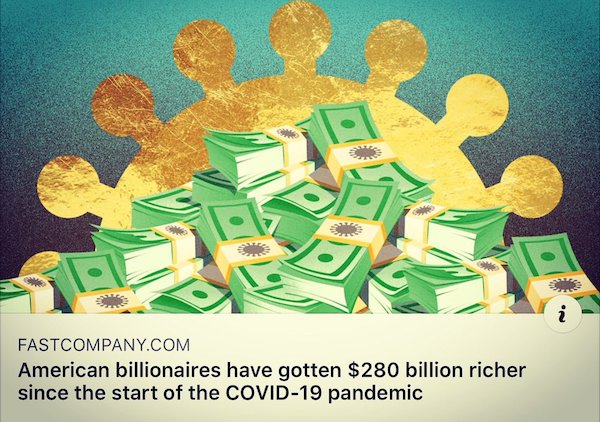
• Between January 1, 2020 and April 10, 2020, 34 of the nation’s wealthiest 170 billionaires saw their wealth increase by tens of millions of dollars. Eight have seen their net worth surge by over $1 billion.
• As of April 15, Jeff Bezos’s fortune had increased by an estimated $25 billion since January 1, 2020. This unprecedented wealth surge is larger than the Gross Domestic Product of Honduras, $23.9 billion in 2018.
• Between March 18 and April 10, 2020, over 22 million people lost their jobs as the unemployment rate surged toward 15 percent. Over the same three weeks, U.S. billionaire wealth increased by $282 billion, an almost 10 percent gain.
• Billionaire wealth rebounded quickly after the 2008 financial crisis. Between 2010 and 2020, U.S. billionaire wealth increased 80.6 percent, more than five times the median wealth increase for U.S. households.
• Between 1990 and 2020, U.S. billionaire wealth soared 1,130 percent — an increase more than 200 times greater than the 5.37 percent growth of U.S. median wealth.
• Measured as a percentage of their wealth, the tax obligations of America’s billionaires decreased 79 percent between 1980 and 2018.

The UK is in no position to relax.
• Over 100,000 Virus Deaths in 2020 If UK Lockdown Ends Early – Ferguson (St.)
The UK death toll could jump past 100,000 by the end of the year if lockdown is lifted too early, a top professor has warned. Imperial College epidemiologist Professor Neil Ferguson said if the healthy go back to work while the vulnerable remain in lockdown there will be a huge increase in virus fatalities. The expert said social isolation will need to be kept in place until a pharmaceutical intervention is found, whether that is a vaccine or treatment drugs, and one is unlikely within the next year. His warning comes as the British Government faces intense pressure to reveal its Covid-19 lockdown exit strategy .
Speaking to UnHerd, Prof Ferguson said he is sceptical that the UK can achieve a level of shielding that will be effective. “If you just achieve 80 per cent shielding – and 80 per cent reduction in infection risk in those groups – we still project that you would well over 100,000 deaths this year from that kind of strategy,” he said. The Government is under pressure from senior Tories to relax the strict social-distancing measures amid concern at the damage they are doing to the economy. Sir Keir Starmer has also called on the Prime Minister to produce a clear lockdown exit strategy.
https://twitter.com/ThePalpitations/status/1254529121134264322

Modeling in finance is as bad as in epidemiology.
• UK Economy Will Take Three Years To Recover From Coronavirus – EY (G.)
It will take the UK economy three years to fully recover from the fallout of the coronavirus pandemic, according to a leading forecasting group. As the damage for jobs and growth unfolds, the EY Item Club said it would take until 2023 for the the economy to return to the level reached at the end of last year due to the depth of the crisis. One month on from the imposition of lockdown measures across Britain, effectively bringing large swathes of the economy to a halt, the group warned that almost half of all consumer spending in 2020 – the major engine of UK growth over recent decades – is at risk of either being delayed or lost completely.
The group of economists said GDP was set to collapse by 6.8% in 2020, before returning to positive growth of 4.5% in 2021 as businesses try to make up for lost time and consumers ramp up their spending again. The forecast is based on the assumption that some lockdown restrictions will start to be eased in May, with controls relaxed further in June. As such, the Item Club believes the economy should benefit later in the year from a degree of pent-up demand as people are allowed to travel again and return to the shops. Howard Archer, the chief economic adviser to the Item Club, said the report assumes that the government’s measures aimed at supporting businesses and saving jobs would have a significant positive impact. “[The support] is absolutely crucial to limiting the potential longer-term damage to the economy,” he said.

After all the lockdown- and economic recovery talk, there’s still the real world.
• One In Three UK Doctors Left Without Protective Gear (Ind.)
More doctors are being forced to treat coronavirus patients without protective equipment, it has been revealed, as Dominic Raab refused to say when shortages would finally end. A third of physicians working in high-risk settings have reported running short of long-sleeved gowns or full-face visors – a situation that has “worsened over the past three weeks”, the Royal College of Physicians (RCP) said. Of those working in other hospital areas, 40 per cent are not always equipped with eye protection, while 15.5 per cent are sometimes left without fluid-repellent face masks. They are faced with the “awful” choice “between protecting our own lives or protecting those of the patients we treat”, one physician said.
The grim survey results were disclosed as Mr Raab admitted the government has fallen short on protecting frontline NHS and care staff, more than a month after Boris Johnson insisted PPE would be provided. Asked when there would be “enough”, the stand-in prime minister said: “It’s very difficult to say that with precision and the kind of reliability that you want as a guarantee.” And asked to acknowledge that some medical and care staff had been let down, Mr Raab replied: “I think we’re not in the place on PPE that we’d want to be.”

Can’t do anything that involves crowds. Not for a very long time. Forget about soccer games.
• Italy To Reopen Factories In Staged End To Coronavirus Lockdown (R.)
Italy will allow factories and building sites to reopen from May 4 and permit limited family visits as it prepares a staged end to Europe’s longest coronavirus lockdown, Prime Minister Giuseppe Conte said on Sunday. More than two months after the first case of COVID-19 appeared in a small town outside Milan and following weeks of lockdown, Italy is looking ahead to a second phase of the crisis in which it will attempt to restart the economy without triggering a new wave of infections. “We expect a very complex challenge,” Conte said as he outlined the road map to restarting activities put into hibernation since early March. “We will live with the virus and we will have to adopt every precaution possible.”
Manufacturers, construction companies and some wholesalers will be allowed to reopen from May 4, followed by retailers two weeks later. Restaurants and bars will be allowed to reopen fully from the beginning of June, although takeaway business will be possible earlier. “The reopening is allowed on condition that all companies involved strictly respect security protocols in the workplace,” Conte said, adding that the reopening would lay the ground for deeper reforms of the economy in the months ahead. In addition, parks will be allowed to reopen and limited family visits and funerals with no more than 15 people present will be permitted. But movement between regions remains suspended and people moving about will still have to carry a declaration explaining the reasons for their journeys.
Museums and libraries can reopen from May 18, when sports teams will also be able to resume group training, although Conte said conditions would have to be assessed before any decision on resuming the top-flight Serie A soccer championship. Schools will remain shut, however, until the start of the new academic year in September, leaving families facing childcare problems for months to come.

Let’s make a deal: stop talking about relaxing lockdowns until you can test 1 million people per day. That would still mean it takes a year to test every American just once. Which is nowhere near enough.
• Fauci Says US Coronavirus Testing Likely Will Double In The Coming Weeks (JTN)
The current amount of COVID-19 testing likely will double in the coming weeks, Dr. Anthony Fauci said during a National Academy of Sciences panel about the virus. “We’re doing about 1.5, 2 million per week,” said Fauci, the Director of the National Institute of Allergy and Infectious Diseases. “We probably should get up to twice that as we get into the next several weeks, and I think we will. “Testing is an important part of what we’re doing, but is not the only part,” Fauci noted. “But no doubt it is important to be able to do the identification, isolation and contact tracing.”
Fauci, who has factored prominently in the daily coronavirus task force briefings at the White House, said it is important to have “enough tests to respond to the outbreaks that will inevitably occur as you try and ease your way back into the different phases.” As the nation moves toward reopening in the aftermath of the coronavirus pandemic, President Trump has issued Guidelines for Opening Up America Again, which include three phases.
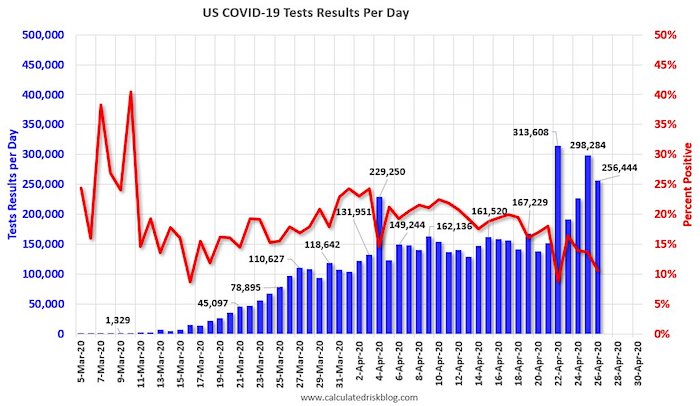

aka lend to the big boys until there’s nothing left.
• US To Cap How Much Each Bank Can Lend Under Emergency Coronavirus Program (R.)
The U.S. government notified lenders on Sunday that it will cap how much each bank can lend under the emergency loan program designed to keep workers on payrolls amid the coronavirus pandemic, hours ahead of the reopening of the lending program. The Small Business Administration (SBA) will impose a maximum dollar amount for individual lenders at 10% of Paycheck Protection Program funding, or $60 billion per lender, and pace the applications filed, according to SBA guidance on Sunday to lenders that have received a significant number of applications. The steps are “prudent and reasonable” due to the unprecedented demand for the loans, the memo said. U.S. banks were girding over the weekend for another frantic race to grab $310 billion in fresh small-business aid due to be released by the government.
The SBA was due to reopen PPP funding at 10:30 a.m. ET (1430 GMT) on Monday, allowing lenders to resume processing piles of backlogged applications from businesses hurt by the coronavirus shutdown. The SBA will also take applications in one bulk submission with a minimum of 15,000 loans, the SBA said in the memo. The PPP came under criticism after a number of publicly traded companies with thousands of employees and hundreds of millions of dollars in annual sales got loans, while smaller businesses did not. Nearly 5,000 lenders, including big banks such as JPMorgan Chase and Citigroup as well as community banks, participated in the prior, $349-billion round of funding. No lender accounted for more than 5% of that total, the SBA said previously.

US media need this kind of topic; they’d be completely lost without Trump.
• Not The End Of The Road For US Health Secretary Azar, Trump Says (JTN)
President Trump emphatically denied Sunday that he is planning to fire Health and Human Service Secretary Alex Azar, calling reports of an impending dismissal “fake news.” Trump made the comments on Twitter, after multiple reports surfaced over the weekend that Azar’s job is in jeopardy, including in The Wall Street Journal. “Reports that H.H.S. Secretary @AlexAzar is going to be “fired” by me are Fake News,” Trump tweeted. “The Lamestream Media knows this, but they are desperate to create the perception of chaos & havoc in the minds of the public. They never even called to ask.
He added for emphasis: “Alex is doing an excellent job!” White House spokesman Judd Deere also called the reports inaccurate. “The Department of Health and Human Services, under the leadership of Secretary Azar, continues to lead on a number of the President’s priorities,” Deere said. “Any speculation about personnel is irresponsible and a distraction from our whole-of-government response to COVID-19.”

CMBS = Commercial Mortgage-Backed Securities. The Fed will bail them out.
• How the Unicorn Blowup & Oil Bust Bleed into CMBS (WS)
The office segment of the commercial real estate market – and the debt and the commercial mortgage-backed securities (CMBS) that are backed by it – are going through serious gyrations on a combination of factors. Companies have figured out how to make work-from-home manageable. Other companies are moving out, leaving buildings vacant, or are deferring rent payments. Landlords whose cashflow from rents has suddenly crashed are failing to make their mortgage payments or are asking for forbearance. And CMBS are at the receiving end of the process.
That any return to the old normal for landlords, banks, and holders of CMBS is just a dream is now being increasingly accepted, including by Larry Fink, CEO of mega asset-manager BlackRock: “I don’t think any company’s going to go back to 100% of the workforce in the office,” he said at an online event. “That means less congestion in cities. It means, more importantly, less need for commercial real estate.” This new era of office real estate comes on top of the problems currently erupting: Tenants moving out for nicer digs, now that there are plenty available, or tenants laying off people and possibly shutting down. So here are two specific examples of how this is bleeding into CMBS.

Given the efficiency of the internal combustion engine, plus the ubiquity of plastics made from oil, its overall effect has always been at least 90% waste.
The magnitude of how damaged the energy industry is came into full view on April 20 when the benchmark price of U.S. oil futures, which had never dropped below $10 a barrel in its nearly 40-year history, plunged to a previously unthinkable minus $38 a barrel. In just a few months, the coronavirus pandemic has destroyed so much fuel demand as billions of people curtail travel that it has done what financial crashes, recessions and wars had failed to ever do – leave the United States with so much oil there was nowhere to put it. While the unusual circumstance of negative oil prices may not be repeated, many in the industry say it is a harbinger for more bleak days ahead, and that years of overinvestment will not correct in a period of weeks or even months.
“What happened in the futures contract the other day indicated things are starting to get bad earlier than expected,” said Frederick Lawrence, vice president of economics and international affairs at the Independent Petroleum Association of America. “People are getting notices from pipeline companies that say they can’t take their crude anymore. That means you’re shutting down the well yesterday.” Evidence of the erosion of value for a product that has been a mainstay of global society since the late 19th century abounded across the world last week. In Russia, one of the world’s top producers, the industry is considering resorting to burning its oil to take it off the market, sources told Reuters.

And who are the experts? Investors. Who only want “to go green” because it promises a big profit.
Green is turning into a swearword, but so many people are invested in it they fail to notice.
The Green New Deals will destroy our ability to save anything, not help it. They will be a huge pool of malinvestment and gobble up what we have left.
• EU’s COVID Recovery Spending Should Be Guided By Green Finance Plan (R.)
Planned European Union rules requiring investments to be in line with climate policy should be used to guide economic recovery measures after the coronavirus pandemic, despite not yet being law, the bloc’s expert advisers said on Monday. With the bloc headed for a steep recession and its executive, the European Commission, drawing up a trillion-euro recovery plan, calls are growing from politicians, companies and campaigners to make sure the money does not prop up environmentally damaging industries. The Commission had planned to introduce rules on which investments can be called “green” from 2021, forcing providers of financial products to disclose which investments meet the criteria – known as the EU “sustainable finance taxonomy”.
However, the Commission’s Technical Expert Group (TEG), a 35-member panel of investors, business leaders and climate policy experts, said the rules – designed by the TEG, at the Commission’s request – should inform stimulus plans now. “The opportunity for a resilient, sustainable and fair economic recovery is right before us. We encourage all governments, public institutions and the private sector to use the right tools for the job,” it said in a statement. The TEG has also drawn up a green bond standard for the EU and a framework to assess whether financial instruments, contracts or investment funds conform with the goals of the Paris Agreement on climate change. “There’s going to be, potentially, a surge of public and private spending to reboot the economy,” said Nathan Fabian, chief responsible investment officer at the U.N.-backed Principles for Responsible Investment investor group and member of the TEG.

“Authorities “assume that people infected animals”…
• Minks Test Positive For COVID19 At Two Dutch Farms (EN)
Two Dutch mink farms have reported cases of COVID-19 among their animals, the country’s Ministry of Agriculture confirmed on Sunday. Minks at the two farms located within 15km of each other in southern Netherlands “showed various symptoms including respiratory problems,” the ministry said in a statement. Mink are dark-colored, semiaquatic, carnivorous mammals bred for their furs. An investigation has been launched to determine the source of the infections. Authorities “assume that people infected animals” as the two farms had employees with symptoms for COVID-19 and stressed that although “human to animal contamination is possible, the impact of this mink contamination on human health is currently negligible”.
To prevent the spread of the disease to other farms, both animals and manure are banned from leaving the infected farms. Samples are being collected from healthy and infected animals with authorities also collecting air and dust samples in the vicinity “as a precaution”. The ministry said public roads around the two frame have been closed and advised people not to walk or cycle within a 400-metre radius until the samples have been analysed.

They didn’t even bother about legislation. Betcha that’s true for most countries.
• Israel’s Top Court Says Government Must Legislate COVID-19 Phone-Tracking (R.)
Citing grave dangers to privacy, Israel’s Supreme Court ruled on Sunday that the government must bring its use of mobile phone tracking deployed in the battle against the new coronavirus under legislation. Circumventing parliament in March, Prime Minister Benjamin Netanyahu’s cabinet approved emergency regulations that enabled the Shin Bet internal security service to tap into cellular data to retrace the movements of people infected by the virus. The technology, customarily used for anti-terrorism, has since yielded data used by the Health Ministry to locate and alert those who have been in their vicinity. The practice has been subjected to some parliamentary oversight following a subsequent court ruling.
Accepting petitions from Israeli rights groups, the Supreme Court said the government must begin legislation by April 30 and complete it within a few weeks if it wanted to continue tracking people’s phones in its bid to stop the virus spreading. “The state’s choice to use its preventative security service for monitoring those who wish it no harm, without their consent, raises great difficulties and a suitable alternative, compatible with the principles of privacy, must be found,” the court said. Citing freedom of the press, the court also ruled that monitoring of journalists confirmed to have been infected with the coronavirus can only be done with their consent. If they refuse, members of the media could seek an injunction against the practice, in order to protect their sources.

After this morning, proceedings have been adjourned until 4 May. Defense and prosecutors both want the May 18 hearing pushed forward to September at the earliest. Even highly partial judge Vanessa Baraitser says question of 18 May start date now “at best uncertain”.
The next period the court would be available for 3 weeks is from 2 November. She should order him freed on bail until then. No threat to his environment, no flight risk.
• Assange: Espionage is the Charge, But He’s Really Accused of Sedition (Lauria)
The United States has had two sedition laws in its history. Both were repealed within three years. Britain repealed its 17th Century sedition law in 2009. Though this crime is no longer on the books, the crime of sedition is really what both governments are accusing Julian Assange of. The campaign of smears, the weakness of the case and the language of his indictment proves it. The imprisoned WikiLeaks publisher has been indicted on 17 counts of espionage under the 1917 U.S. Espionage Act on a technicality: the unauthorized possession and dissemination of classified material—something that has been performed by countless journalists and publishers over the decades. It conflicts head on with the First Amendment. But espionage isn’t really what the government is after. Assange did not pass state secrets to an enemy of the United States, as in a classic espionage case, but rather to the public, which the government might well consider the enemy. Assange revealed crimes and corruption by the state.
Punishing such legitimate criticism of government as sedition has deep roots in British and American history. Sedition was seen in the Elizabethan era as the “notion of inciting by words or writings disaffection towards the state or constituted authority.” Punishment included beheading and dismemberment. “In their efforts to suppress political discussion or criticism of the government or the governors of Tudor England, the Privy Council and royal judges needed a new formulation of a criminal offence … This new crime they found in the offence of sedition, which was defined and punished by the Court of Star Chamber.… If the facts alleged were true, that only made the offence worse,” wrote historian Roger B. Manning. Sedition fell short of treason and did not need to provoke violence.
Though the Star Chamber was abolished in 1641, the British Sedition Act of 1661, a year after the Restoration, said, “…a seditious intention is an intention to bring into hatred or contempt, or to exite disaffection against the person of His Majesty, his heirs or successors, or the government and constitution of the United Kingdom.” Under President John Adams, the first U.S. Sedition Act in 1798 put it this way: “To write, print, utter or publish, or cause it to be done, or assist in it, any false, scandalous, and malicious writing against the government of the United States, or either House of Congress, or the President, with intent to defame, or bring either into contempt or disrepute, or to excite against either the hatred of the people of the United States, or to stir up sedition, or to excite unlawful combinations against the government, or to resist it, or to aid or encourage hostile designs of foreign nations.”
While WikiLeaks publications have never been proven false, the U.S. government is certainly portraying its work as “scandalous and malicious writing against the United States” and has accused him of encouraging “hostile designs” against the country. Congress did not renew the Act in 1801 and President Thomas Jefferson pardoned those serving sentences for sedition and refunded their fines.
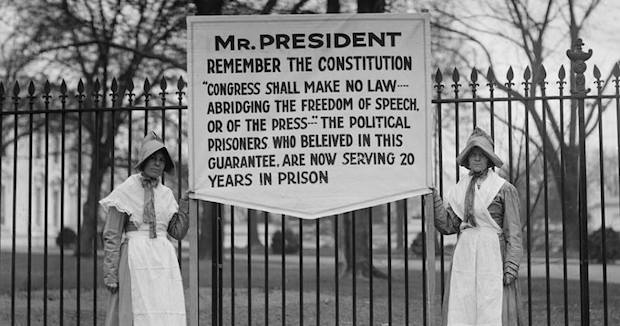
1918 protest in front of the White House against the Sedition Act.

We try to run the Automatic Earth on people’s kind donations. Since their revenue has collapsed, ads no longer pay for all you read, and your support is now an integral part of the process.
Thanks for your generosity.

How long do you think it would take you to completely disinfect a hospital room? Made by UVD Robots, this UV-Disinfection robot can disinfect a hospital room in about 15 minutes – without using any chemicals. pic.twitter.com/kaWxOWqvTb
— CNET (@CNET) April 26, 2020

Support the Automatic Earth for your own good.








Home › Forums › Debt Rattle April 27 2020